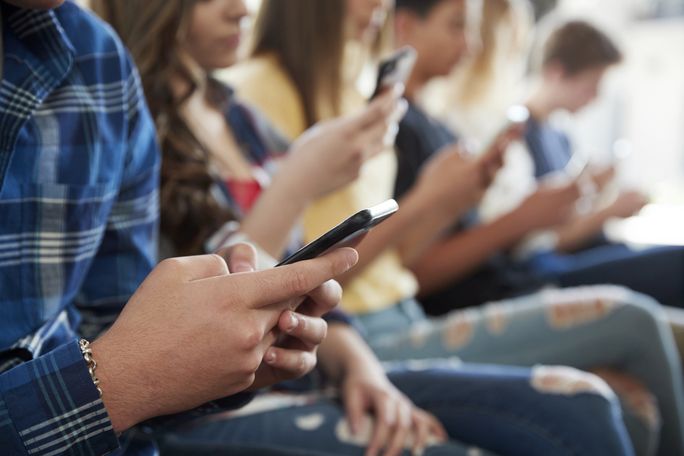Does Social Media Connect or Disconnect Us?
How much time do you spend on social media every day? I recently installed an app on my phone that tells me how much time I spent on my phone every day, and I was shocked!

While social media is intended to connect us, overuse can actually lead to feelings of discontentment and loneliness (in other words, disconnection!). One study showed that even just one hour a day of social media use could decrease young people’s likelihood to say they are “completely satisfied with life overall” by 14 percent!
Why does something intended to be positive create these negative feelings, and what can we do about it?
Real world?
Spending lots of time on social media can lead to feeling disconnected from and unsatisfied by the real world. Many people only show their best highlights on social media—the dates, new gadgets, trips or even their newly reorganized desk. The mundane details of daily life are rarely shown, but you can be sure they exist! While sharing accomplishments and updates isn’t wrong, it can be taken to an extreme. People may begin to put a filter over every aspect of their lives to make things seem better than they really are.
Between filters and the constant highlight reel we see on social media, we can begin to feel like our lives don’t measure up to the excitement of everyone else’s. We begin to think our own life is boring by comparison. In turn, we may feel the desire to portray our own experiences as more exciting than they really are, contributing to the cycle.
Loneliness
One side effect of too much time on social media is a general feeling of loneliness. Loneliness describes the feeling of sadness due to not having enough real friends and feeling a lack of connection to and communication with other people at various times.
When we feel alone, we naturally seek connection. And many people try to find this connection through social media networks. But browsing social media can actually increase our feelings of loneliness for several reasons. Connecting virtually can make us feel better temporarily, but leave us feeling even more unsatisfied because these relationships tend to be superficial. In addition, constant connection to social media is ultimately dissatisfying if we allow it to become a substitute for real-life social interactions.
Discontentment
Another problem that can arise from overuse of social media is feelings of discontentment. Think back on the last week or so; how much time have you spent on social media? Do you generally feel satisfied and uplifted after checking Instagram, Twitter or Facebook? Or do you feel like you’re missing out or don’t quite measure up to others?
Dr. Tim Bono, author of When Likes Aren’t Enough, explains, “When we derive a sense of worth based on how we are doing relative to others, we place our happiness in a variable that is completely beyond our control.”
The apostle Paul similarly wrote that it is not wise for Christians to compare themselves among themselves (2 Corinthians 10:12). Why is comparing ourselves to other people so dangerous?
Discontentment, envy and resentment often go hand in hand when we get into the habit of comparing our lives to what we see online.
Proverbs 14:30 tells us that a sound heart is life to the body, but envy is rottenness to the bones. Discontentment, envy and resentment often go hand in hand when we get into the habit of comparing our lives to what we see online. This proverb illustrates that envy eats us up from the inside out. It consumes our peace of mind and our happiness. When we’re in that state of mind, it’s hard to stay close to God and hard to build other people up.
What’s the solution?
What should you do if you find that social media time is negatively affecting your relationship with God or other people, or causing you to feel lonely and discontent?
A good first step is to acknowledge the effects of social media in your spiritual life and relationships. Commit to taking a step back from how much time you are spending on it, and make an action plan to do so. Do you tend to check Facebook or Instagram first thing in the morning or whenever you’re bored? What situations tend to lead you to spend increased time on social media?
Once you’ve identified those, look for positive ways to invest your time instead. Work on your relationships with God and others! Regular, quality communication is key to building relationships. We communicate with God through prayer and Bible study. If you don’t have a regular habit of Bible study and prayer, now is a great time to start! We can also make an effort to regularly spend time with other people in healthy social situations.
A key to fighting discontentment is regularly reflecting on God’s blessings in our lives. This grows a mind-set of gratitude. Gratitude is a very effective way to combat unhappiness and discontentment. We can also seek out ways to serve others: write a card or letter to someone who needs prayers or a relative or friend you don’t see very often. Get to know people. Investing in others helps us to feel more connected.
Social media can be a great way for us to stay connected with long-distance friends and family. But it can also be dangerous if we begin to compare our lives to those of others or use it as a substitute for real-life social interaction. When we start to feel discontent or lonely after using social media, we must remember to take a step back and refocus ourselves on our relationships with God and other people and be thankful for the blessings in our life.
Date Posted: July 1, 2019

 by Gabriella Ware
by Gabriella Ware

